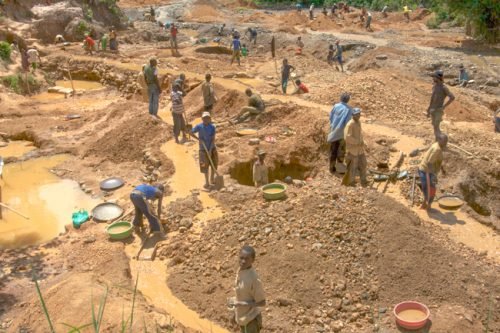
AN outcry by affected communities on the activities of illegal miners in Osun and Ekiti states calls for concern. Illegal miners have reportedly invaded large tracts of land, chasing away farmers, degrading the soil and depriving communities and the public treasury of the benefits of their natural resources. The two South-West states should act quickly to avoid the grave consequences associated with unregulated mineral exploitation.
Reports paint heart-wrenching pictures of the depredation going on in gold-rich communities like Idoko, Ibala, Itagunmodi, Iponda, Araromi, and urban neighbourhoods in the Ijesa heartland, Osun State. Illegal miners dislocated from Zamfara by the military onslaught and other predators are said to have descended like locusts on Arimoro and Isale General areas of Ilesa – and rural communities across Obokun, Atakumosa East, Atakumosa West, and Oriade local government areas.
Similar havoc is underway at Ijero LGA, Ekiti State, where unlicensed artisans drill for gold, limestone, columbite, tourmaline stone and other mineral deposits in contravention of the Nigerian Minerals and Mining Act, 2007, and the Nigerian Minerals and Mining Regulation, 2011.
As seen in the Zamfara implosion, illegal mining, if not tamed, would inexorably culminate in violent crimes such as banditry and terrorism. Stamping it out is therefore crucial. Illegal mining has been blamed as a main trigger for the explosion in banditry in Zamfara that has spread all over the North-West. The state government estimates that there are over 30,000 bandits/terrorists/kidnappers in Zamfara alone. Security agencies confirm that the bandits have forged close alliances with Islamist terrorist groups. Osun State should therefore swing into action to stop criminality and the despoliation of its natural resources.
The government must identify and punish traditional rulers and community leaders allegedly colluding with illegal miners. Some are reportedly forcibly seizing and selling people’s farmland to Chinese, Malians, and Nigerien nationals. These are also said to front for politically connected individuals who collaborate with foreign corporations; stolen gold is routinely smuggled to the United Arab Emirates through neighbouring Niger and Togo. Frequent seizures of gold from Nigeria by Nigerian and Emirati customs anti-smuggling units attest to the thriving illegal business.
Osun and Ekiti governors should demonstrate responsible leadership by halting the unconscionable plunder. They should protect the people from the concomitant harassment and criminality unleashed on the communities by the illegal miners. Flush with money and firearms, illegal miners constitute a potent threat to the state and the entire Southern region.
Allegations that several culprits and their collaborators were freed after arrest should be probed and the necessary sanctions applied. Nothing has been heard about the prosecution of 17 Chinese, 10 locals and one community leader arrested on May 4, 2020, by the Osun State Amotekun Corps in Ilesa and Ile- Ife areas.
Decisive action taken today would avert a replay of the 2010 lead poisoning saga in Zamfara in which over 500 children died. The tragedy was attributed to unregulated gold mining activities. Experts say this could lead to long-term health problems such as permanent learning and behavioural problems and brain damage.
According to studies, illegal explorations result in the formation of sinkholes, contamination of soil, ground, and surface water pollution, and loss of biodiversity. The economic loss is also enormous; it causes poor soil fertility and limits access to land for agriculture.
The government should formalise the activities of artisanal miners and improve mining infrastructure requirements by promoting public-private partnerships and attracting private investment. An estimated 80 per cent of mining activity in the North-West is carried out illegally and on an artisanal basis. These artisanal miners produce roughly 10 tonnes of gold annually; they sell at a local value of 70-80 per cent of the international price. Essentially, the mining of large untapped mineral deposits in the area is at the root of community violence.
Nigeria has 44 types of untapped deposits of minerals, including gold, tin, and zinc, but the contradictory federal structure that places mining on the exclusive legislative list had hitherto made it difficult for states to take full advantage of these resources. Consequently, the state governments lack the power to police and regulate mineral resources.
The 2016 Mining Growth Roadmap reveals that Nigeria has an untapped 200 million ounces of gold, scattered across about 13 states, Osun inclusive. Potentially, this could fetch trillions of dollars over time.
But revenue from the sector has remained paltry. Between January and August 2021, the finance ministry revealed that Nigeria earned only N2.44 billion as minerals and mining revenue, which is less than one per cent of the N754.16 billion oil revenue received within the same period. Experts say gold mining in Zamfara alone could fetch $ 1 billion annually.
Similarly, in 2019, the Nigeria Extractive Industries Transparency Initiative said royalties received from 39 minerals was just N2.5 billion, with limestone contributing 37.68 per cent, granite 31.31 per cent and gold 0.26 per cent, despite the high volume of mining activities by illegal miners. The country loses $9 billion to illegal mining annually, with the little revenue in the sector coming from the three per cent royalty paid by the few licensed miners.
NEITI reported that increased activities in gold mining in recent years did not reflect in production volumes or royalty payments, adding, “Gold has potential to attract foreign exchange for Nigeria. Unfortunately, the mineral has not received the attention it deserves in the form of investments.”
Data from UN Comtrade reveals that between 2012 and 2018, about 97 tonnes of gold worth over $3 billion was illegally smuggled out of Nigeria. Accelerated implementation of the Presidential Gold Mining Development Initiative can jump-start the revenue and employment opportunities in this untapped goldmine.
Mining offers a great pathway for the federal and state governments to help solve the ongoing revenue shortages, create jobs, spur industrialisation, and stop criminality. State governments should take advantage of the federal concession encouraging them to form joint ventures with and attract investors and participate fully in the mining sector. They should act without further delay.





